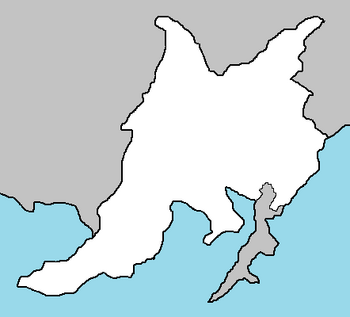Verdusa
Republic of Verdesa | |
|---|---|
|
Flag | |
 | |
| Capital | Shanadu |
| Official languages | Verdusian |
| Demonym(s) | Verdusan, Verdusi |
| Government | |
| Valtena Leo | |
| Population | |
• 2020 estimate | 17,801,000 |
| Date format | mm-dd-yyyy |
The Republic of Verdusa, most commonly known as Verdusa, is a nation located in eastern Adula, bordered by Emmiria to the north, Rajihat and San Martina to the south, and coastlines along the Haifan Sea and Emmiria Sea. The capital and largest city is Shanadu, with other major settlements including the holy city Yerusalahm and the port city of Haifan. Eighty percent of Verdusa is mountainous, with Mount Grecia being the highest peak at 2,918 metres (9,573 ft). Verdusa is regarded to be one of the cradles of the world's civilizations, being the birthplace of democracy as well as many forms of philosophy, literature, historiography, political science, major scientific and mathematical principles, and drama. It is also considered the birthplace of Judaism and Christianity, and a religiously important land for Islam and Rajitism, with the city of Yerusalahm being one of the oldest and holiest cities in the world.
In antiquity, Verdusa was home to several Verdusi Jewish kingdoms, including Haifan, Verdus, Shanadu, and is referred to as the Land of Verdus in Jewish tradition. Over the ages, the region was ruled by powers such as the Emmirians, Quetanans, Skithans, and Behinians. In the Middle Ages, it was part of the Islamic Caliphates of Emmiria, while the late 19th century saw Jewish immigration to the region increase considerably, leading to tensions between Jews and the Rajit and Muslim majority populations. Verdusa was granted an autonomous government within the Islamic Republic of Emmiria in the early 20th century, led by a Jewish governing board. A nationalist movement after the World War, supported by many foreign governments, led to the Emmirian government granting Verdusa independence in 1957. Democratic elections were held under a constitution which insured shared power between the Jewish, Muslim, Christian, and Rajit populations. In 1987, a coup d'etat led by Rajit military officials attempted to overthrow the government of Verdusa, leading to a violent civil war that lasted until 1989. A CCA peacekeeping force, mostly made up of neighboring San Martinan and Emmirian troops, was sent to defend international workers and protect safe-zones established by the Coalition and the Verdusian government. Following the civil war, there have been sporadic clashes between fractioned groups, though the country has largely remained peaceful and developed into a growing economy.
Verdusa is a unitary parliamentary republic and developed country with an advanced middle-income economy, a high quality of life, and a very high standard of living. Verdusa's unique cultural heritage, large tourism industry, prominent shipping sector and geostrategic importance classify it as a middle power. It is a member of the Coalition of Crown Albatross, Coalition Trade Organization, and several other organizations. It has remained largely neutral in foreign policy historically, especially since the end of the civil war.
